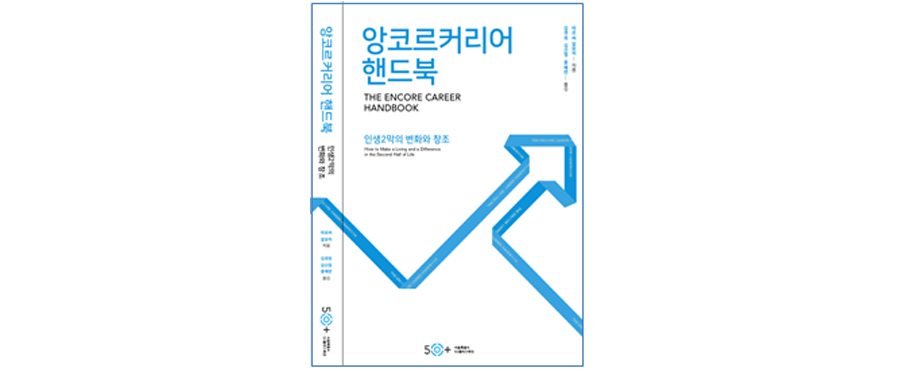대한민국의 앙코르커리어를 응원합니다
마르씨 알보허 Marci Alboher
「앙코르커리어핸드북:인생2막의 변화와 창조」의 원서 저자
앙코르닷오르그 부대표, 커리어 트렌드 및 일자리 전문가
얼마 전 「앙코르커리어 핸드북: 인생2막의 변화와 창조(The Encore Career Handbook: How to Make a Living and a Difference in the Second Half of Life)」의 한국어 번역본 출간 요청 이메일을 받았을 때 나는 엄청 신이 났다. 결국 모든 작가의 꿈은 내가 쓴 글이 세계 곳곳의 독자들에게 읽히는 것이 아니겠는가? 물론, 걱정도 이만저만이 아니었다. 책이 한국어로 잘 번역이 되었는지 확인할 길이 없으니 내용이 잘 전달되지 않으면 어쩌나 싶었다.

「앙코르커리어핸드북」은 퇴직 이후에도 목적 있는 삶을 살면서 삶의 만족감을 얻고 꾸준한 경제 활동을 통해 수입을 얻는 사람들의 이야기로 채워져 있다. 단, 책 속의 주인공들이 모두 미국의 사례이고, 미국과 한국의 경제적, 사회적 환경의 차이도 있는지라 염려되지 않을 수 없었다. 그러나 한편으로는 너무 걱정하지 말아야겠다는 생각도 들었다. 나는 한국에서도 퇴직의 개념을 재정의 하고, 중장년 및 노년층이 가진 경험과 지식을 사회의 동력으로 이용하려는 움직임이 있다는 것을 익히 알고 있었다. 서울특별시50플러스재단의 김만희 일자리사업본부장을 비롯한 관계자들을 만난 뵌 적이 있었는데, 이들은 퇴직을 곧 맞이할 세대가 각자 의미있는 인생2막을 모색할 수 있는 “앙코르(Encore)” 프로그램을 기획 및 운영하고 있었다.
그들과의 만남을 통해 서울특별시50플러스재단이 하는 일과 재단의 비전을 실현하려는 박원순 서울시장의 정책의지도 알게 되었다. 미국에서 앙코르 운동(Encore movement)을 추진하는 앙코르닷오르그(Encore.org)의 동료들이 서울을 방문한 적도 있고, 재단 관계자와 한국에서 앙코르운동을 추진하는 주요 리더들이 앙코르닷오르그에서 미국에서 개최하는 행사에도 몇 차례 참석한 바도 있다.
한국은 미국이나 다른 여러 나라들과 비슷한 인구 통계적 변화를 마주하고 있고, 이로 인해 제기되는 질문과 문제점들 또한 유사하다. 2040년에는 대한민국 인구 10명 중 4명이 60세 이상이 될 것으로 예측되는데, 이는 세계에서 가장 고령화된 나라 중 하나에 꼽히는 수준(Milken Institute,2015) 이다. 60세 이상 인구 층이 생산 인구 층에서 탈락하게 되면 한국 사회에 어떤 영향을 줄 주게 될까? 기업들은 인구의 40%가 지닌 재능 없이도 성장할 수 있을까? 연금 시스템을 부양할 취업 연령의 성인은 충분할까? 돌봄제공자나 간호사, 또는 의료 종사자들처럼 사람만이 할 수 있는 일자리를 감당할 인구가 턱 없이 부족하지는 않을까?
이러한 문제들 앞에서 아마도 가장 중요한 것은 어디에 살든지 ‘사람은 사람’이라는 사실이다. 그리고 삶의 의미를 찾게 하는 요인이나 목적, 그리고 인생 후반기에 후손들에게 물려줄 유산은 지극히 인류 보편적이다. 대략 40~60대 중반으로 정의되는 중·장년층(middle adulthood)에 다다르면 사람들은 자기 자신을 넘어서는 어떠한 활동에 온전히 집중하고 싶은 자연스러운 충동을 경험한다. 발달심리학자인 에릭 에릭슨(Erik Erikson)은 이러한 자질을 ‘생산성(generativity)’으로 명명하며, 더 생산적인(more generative) 사람들이 중·장년기에 더 쉽게 움직인다고 설명했다.
하버드 의대의 조지 베일런트(George Vaillant) 교수가 수행한 연구도 비슷한 결과를 제시했는데, 누군가의 멘토(mentor)가 되거나 청년들의 삶이나 일을 지원해 준 사람들이 그렇지 않은 이들에 비해 행복할 가능성이 3배나 높다는 것이었다. 목적에 대한 갈망은 생애 모든 단계에 존재하지만, 시간이 다 되었다고 느끼기 시작하는 인생 후반기에는 그 갈망은 조금 더 다른 특성을 띠게 된다.
삶의 중반부를 지나는 수백 명의 사람들을 인터뷰한 뒤, 미국 로스엔젤리스의 법무부 장관이거나 서울에 어느 사회기업가이든 누구에게나 공통적으로 적용되는 패턴을 발견했다. 당신이 20년에서 30년 동안 일을 해왔다면 - 여기에는 부모로서나 다른 종류의 돌봄을 제공하는 일 또한 포함되는데 - 이제는 휴식을 즉 잠깐이라도 멈춰서 한 숨 돌릴 시간을 간절히 원할 것이다. 하지만 기운을 차리기 위해 ‘쉬는 시간’이 영원할 필요는 없다. 직장을 떠나거나 전업으로 하던 일을 그만둘 준비가 되었더라도 여전히 뭔가 의미 있는 일에 참여하고 싶다는 느낌을 가질 수도 있다. 또한 더 이상은 한 회사에 고용된 사람이 아니라, 스스로 원하는 조건에 맞춰 일할 수 있는 준비가 되었을 수 있다. 바로 이것이 수많은 앙코르커리어가 기업가 정신, 1인 기업, 파트타임 일자리와 관련되어 있는 이유다.
「앙코르커리어핸드북」은 “내 인생의 다음 단계는 무엇일까?”라는 질문을 가진 사람들이 답을 찾아가는데 도움을 주기 위해 지필 한 책이다. 저자인 나의 소망은 이 책이 한국의 독자들에게 인생 후반기에 관한 질문에 스스로 답을 찾아가고, 자신이 가진 기술과 경험, 지혜를 활용할 수 있는 새로운 방법을 발견하고 영감을 주었으면 한다는 것이다. 그래서 이 책의 독자들이 자신이 속한 공동체의 문제를 해소하는 의료 종사자로, 젊은이들의 멘토이자 가이드로, 교사로, 돌봄 제공자로, 벤처 창업을 돕는 사회적 기업가로 사회 곳곳에서 활동할 수 있기를 기대한다. 이런 나의 소망이 한국에서 실현되는 날이 오면 한 통의 이메일을 또 다시 받게 되지 않을까 라는 생각이 든다. 그 내용은 아마도...
“한국인들의 앙코르커리어 스토리를 담은 책을 출판하고자 합니다. 함께 해주시겠습니까?”

<사진> Marci Alboher
Marci Alboher(마르씨 알보허)는 잘나가는 미국 기업의 사내 변호사로 근무하다가 염증을 느껴 회사를 관두고 언론학을 다시 공부하였다. 이후 프리랜서로 뉴욕타임즈 칼럼니스트와 블로거로 활동하여 ‘일자리’이슈에 특화된 칼럼을 게재하기 시작하였으며, 미국에서 앙코르운동을 선도한 앙코르닷오르그 설립자 겸 CEO인 마크프리드먼을 통해 앙코르커리어에 대한 개념을 접하고 사례를 수집하였다. 지금은 앙코르닷오르그 부대표이자 커리어 트렌드 및 일자리 전문가로 활동하고 있다. 다른 저서로는 「One person/ Multiple Careers: The Original Guide to the Slash/Career」가 있다.
동 칼럼은 「앙코르커리어핸드북: 인생2막의 변화와 창조」의 저자 마르씨 알보허의 영문 원고를 국문으로 번역한 칼럼입니다.
「앙코르커리어핸드북: 인생2막의 변화와 창조」은 온⋅오프라인 서점 및 서울시50플러스캠퍼스 상담센터를 통해 만나볼 수 있습니다.
[참고 문헌]
Milken Institute. (2015). 「Wisdom in the Workforce」, Milken Institute.
(원문)
Encore Careers Coming to South Korea
by Marci Alboher
When I got an email expressing interest in publishing The Encore Career Handbook in Korean, I was thrilled. After all, every author’s dream is that their words will have global reach.
Still, I worried that the book might not translate well. The book is filled with stories of people who found purpose, satisfaction and often continued income in years traditionally thought of as retirement. Yet all of those people live in the U.S. and the economic and social policies of our countries have some key differences.
On the other hand, I shouldn’t have been surprised.
I knew that a movement to reframe retirement and harness the experience of older adults had already taken hold in Korea. I had met Manhee Kim and several other leaders who were designing “encore” programs to help people nearing retirement find their ways to meaningful second acts. I knew about the Seoul 50+ Foundation and the commitment of Seoul mayor Park Won-soon to making this vision a reality. Several of my colleagues from Encore.org (the organization fueling the Encore movement in the U.S.) had visited Seoul to meet with these leaders and several leaders from the Korean encore movement had come to encore meetings in the U.S.
What’s more Korea is facing very similar demographic trends as the U.S. and many other countries and raising some of the same questions and concerns. By the year 2040 four out of every ten people will be over the age of 60, making it one of the oldest countries in the world. (Wisdom in the Workforce, Milken Institute, September 2015). And if all of those people left the workforce, what kind of impact would that have on society? Would companies be able to thrive without the talent of 40% of the population? Will there be enough working-age adults to support the pension system? Would there be enough human talent to do the jobs that only human beings can do – caregivers, nurses, healthcare providers?
Perhaps most importantly, people are people, wherever we live. And the factors that drive us to seek out meaning, purpose and legacy later in life are universal. When we reach middle adulthood – loosely defined as between forty and the mid-sixties -- there is a natural urge to focusing our attention on activities that will endure beyond ourselves. The developmental psychologist Erik Erikson described this quality as ‘generativity,’ and wrote that people who are more generative move more easily through middle adulthood. Research conducted by Harvard Medical School professor George Vaillant pointed to a similar idea – people who had become mentors or support younger people in life and work were three times as likely to be happy in life as those who did not.
After interviewing hundreds of people passing through these middle years of life, I noticed some patterns that I suspect are common whether you have been a legal secretary in Los Angeles or a social worker in Seoul. If you’ve been working for twenty or thirty years (including as a parent or other caregiver), you’re probably eager for a rest, a breather, a break. Yet a break doesn’t need to be permanent to be restorative. And while you may be ready to leave your job or leave the world of full-time work, you probably want to remain engaged in something important. It’s also likely that you’re ready to work on your own terms, which is why so many encore careers involve entrepreneurship or working for oneself. And the desire for purpose exists at every stage of life, but it takes on a different character in later life when you start to feel that time is running out.
The Encore Career Handbook is designed to help people move from these questions to answers about what’s next. And my hope is that it will inspire a cohort of Koreans to answer those questions and find new ways to use their skills, experience and wisdom – as healthcare workers, as mentors and guides to young people, as teachers or tutors, as caregivers, or as social entrepreneurs creating ventures that solve community problems. And when that happens, I have a feeling I’ll get another email asking me if we’re ready to agree to a new edition of the book, featuring the stories of Koreans who have found their ways into encore careers.